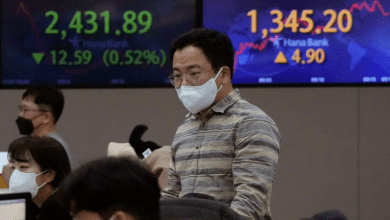
Travelers experience the effects of inflation both at home and abroad.
United Arab Emirates’ Dubai (AP) — People are spending more money on food and fuel, rent, and transportation almost everywhere in the world.
Because they are compelled to spend more when prices increase, migrant workers who transfer money to loved ones abroad often make less savings. Some people’s only alternative is to hustle harder, work evenings and weekends, and take on additional jobs. Others may have to give up once-basic foods like meat and fruit in order to transfer what money they have left to family members who, in certain cases, are experiencing famine or war.
“I used to save a little, about $200 every week. I can now hardly save $100 a week. Carlos Huerta, a 45-year-old Mexican driver employed in New York City, said, “I live by the day.
Lissa Jataas, 49, transfers roughly 200 euros ($195) every month from her desk job in Cyprus to her family in the Philippines across the Atlantic. She shops at discount grocery stores for food and buys clothing at thrift stores to save money.
Being strong is key, she said.
Russia’s conflict in Ukraine, which caused food and energy costs to surge, struck economies already suffering from the shocks of the COVID-19 epidemic and the consequences of climate change.
According to the United Nations Development Program, these expenses caused 71 million additional people to fall into poverty globally in the weeks that followed the February invasion, which halted vital food exports from the Black Sea area.
Money sent to family members doesn’t go as far as it used to when food and gasoline costs soar. According to the International Monetary Fund, worldwide inflation will reach a peak of 9.5% this year, although it is significantly higher in emerging nations.
The director of inequality policy at the anti-poverty group Oxfam, Max Lawson, said that poorer individuals spend a far greater percentage of their income on food and energy.
“It’s almost like impoverished people are sort of like a sponge that are designed to absorb the economic shock,” he said, adding that inflation is “pouring fire” on inequality.
52-year-old Mahdi Warsama emigrated to the US from Somalia when he was a youngster. He is a citizen of the United States and works for the organization Somali Parents Autism Network. He sends anything between $3,000 and $300 every month to family members in Somalia, sometimes borrowing funds to cover urgent expenses like medical bills.
Warsama estimates that he donated $1,500 last month to assist his family pay for essentials like food and water for themselves and their cattle. Warsama divides his time between Columbus, Ohio, and Minneapolis.
A severe drought in Somalia has claimed thousands of lives, and the U.N. estimates that half a million children are at danger of dying from starvation or the approaching famine.
He has altered his spending patterns, is searching for new opportunities to make money, and this year, for the first time, he is keeping track of interest rate increases and inflation.
Warsama said, “I am more resolved to work harder and earn more money.” “I need to be more careful since I have to support my family back home,” the person said.
Huerta has been living apart from his wife and children in New York for for 20 years, doing odd jobs like transporting CEOs or cleaning dishes to make ends meet.
He said that he sends his wife and mother in Puebla, Mexico, roughly $200 every week. Huerta also acquired painting skills, so even if there is no need for a chauffeur, he can continue to make around $150 per day.
With monthly income of roughly $3,600 and rising Queens apartment rent, Huerta said he had cut down on fruit consumption due to skyrocketing costs, substituted chicken for steak, and canceled his TV.
Jaatas, who has been living in Cyprus for over 20 years, assists six relatives in the Philippines who are struggling with growing expenditures as well as the effects of a storm that took out water and power.
Despite disasters or other setbacks, she remarked, “we truly want to support our relatives back home.”
The Philippines is the most food-insecure nation in rising Asia, according to a study by the Carnegie Endowment for International Peace, because of its dependence on imported food.
Filipinos often labor on Sundays in Cyprus, according to Ester Beatty, the director of a branch of the European Network of Filipino Diaspora, in order to help family members back home who are unable to buy basic necessities like rice and sugar.
Even with government subsidies, it is estimated that lower-income households in developing nations spend more than 40% of their family income on food, according to Peter Ceretti, an analyst with the Eurasia Group’s food security at risk consultancy organization.
Ali el-Sayed Mohammed, 26, spent many years looking for job in Egypt before moving to the United Arab Emirates in February.
Because life is costly and salaries are insufficient, he made the decision to leave. “At first, it was a difficult choice, but I had no other option given the circumstances.”
Mohammed is the family’s primary provider, providing for his mother, three sisters, and relatives after the passing of his father. He is from Beheira, a region in the Nile Delta where many of its young men have emigrated, sometimes taking perilous journeys over the Mediterranean Sea in pursuit of employment in Europe.
Mohammed arrived in Dubai with around $1,000 saved up, staying with friends until he was hired at Hadoota Masreya, one of the city’s most well-known Egyptian eateries.
However, the growing cost of living in Egypt has made it tougher for him to achieve his objectives of accumulating enough money to support his sister’s upcoming wedding or to ensure his own future. As the value of the currency has decreased, Egypt’s inflation has increased to roughly 16%, making life increasingly harder for the millions of Egyptians who live in poverty.
According to Mohamed Younis, manager of Hadoota Masreya, “I have a lot of workers whose families depend on the revenue they get from the restaurant and a major amount of their wages are transferred back home so people there can survive.”
According to him, the restaurant recently raised pay in order to keep up with the growing cost of living.
Younis said that more and more Egyptian males are looking for employment. Younis is the owner of the “Restaurant Clinic” YouTube channel, which offers guidance on how to thrive in the restaurant business in Arabic. He cautions that there are hazards associated with shifting to the UAE since doing so requires time and money.
Mohamed Aden, a 36-year-old school bus driver in Minnesota, claims he works a second job as an Uber driver to support his wife, kids, and siblings who emigrated to Kenya from Somalia because of the turmoil there.
His family depends on the money he sends, which accounts for about half of his $2,000 monthly income since he lacks a work permit in Kenya.
However, since petrol is more expensive and food is more expensive in Kenya, his money doesn’t go as far.
Every December, despite the harsh Minnesota winter, Aden attempts to go to Kenya.
“I can’t this year due to inflation,” he stated. “I’m the only one here, taking care of the family’s food,” nonetheless, I’ll return when I have the cash.
Hadjicostis and Ahmed both reported from Nicosia, Cyprus, while Torrens and Hadjicostis did so from New York.





Ha😢
Good
Greet
Cool
Sure
Bgood
Bad
Cool
Nice
Good
Cool
Nice
🌚
Cool
Yep
Yes
Because they are compelled to spend more when prices increase, migrant workers
Good
Hmmmm
Na so he be
Hmmmnn
Good
Yea
Nice
Okay
Okay
So bad all nation affected
Unfair
Sure
May God help us
Ha
Nawa
Amen
Omo this don come again
Inflation really bad
Yep
It is well
Ok
Good
It’s not been easy on this earth for like 3 years now, but God dey
Ok
Ok
Okay
Good
good
Wow
Great
Ok
Good
wow
Good
Good
Good
That’s Bad
Bad
Too bad
Oh nice
Good
Ok
Probably not
Haaaaa not nice
Hmm
Okay
Good
Awesome
Too bad
Home
Good
Ohkay
It’s a world economic recession, I pray it don’t send us bank robbed
That’s bad
That’s bad
Nice
True
Good
Nice
So nice
That was a mistake .. inflation is never good
Really bad
Okay
Okay
Too bad💔
God help us
Ok
Good
Good
God help us
Wow
Nice
Great
Great
Hmm
Awesome
It is usually
Hmmmmmm
Bad
Good
Hmm
Cool
Inflation is really affecting everybody
Good
This inflation is everywhere
Good
God will help us
H
Omoh
Good
The effect of inflation is really affecting alot
Too bad
So bad
Yh
Is well
G
Good
Really
Nice
Inflation is really affecting uu
Hm
Hmmmmm
Ok
Government should do something
Abeg o
Government should do something
Too bad
Not bad
May God keep us all alive 🙏🙌
Nice one
Fantastic
Ohh
Ok
Good
Cool
Great
Gud
Inflation
Great
Hmmmm
Hoi pls
Cool
Well known
Wonderful news
Alright
Good
🚶♀️🚶♀️🚶♀️🚶♀️🚶♀️
Hah ah
Nice one
Wowww
Wow
Great
Great
Great
Good
So discouraging
The economy is so bad
Everything is up
Omo
Nice
Hmm
I’m pretty sure Russia thought all of this through before starting the war
Yh I’m really really sure
Waw
Good luck
Okay
“I used to save a little, about $200 every week. I can now hardly save $100 a week. Carlos Huerta, a 45-year-old Mexican driver employed in New York City, said, “I live by the day.
Kkk
Ok
Really
aiit
May Get d help us
Inflation
Okay
God help us
Ohh
Uj
Special
Special
Hmmmm
Absolutely
Ok
Good
Okay
Yea
Seriously
Seriously
Alright
So bad
Good
Bad
This is serious
Nice
Good
Good
No wam
Hmm
Bad
Not too good
Seriously
Negative impact
Every country in the word is experiencing hardship
Goshhh
War
Ok
Good
Lovely
Great
Nice
Don’t
Wow
That so so good
Ok
hnnnm
Okay
Good
Ok
Nice
Sure
Great
Good
Great
Good
Sure
Pathetic
Ok
God help
Sure
Okay
Alright
Alright
Okay
Ok na
Interesting
Nice
Due to different money rate
Exchange rate
Wow